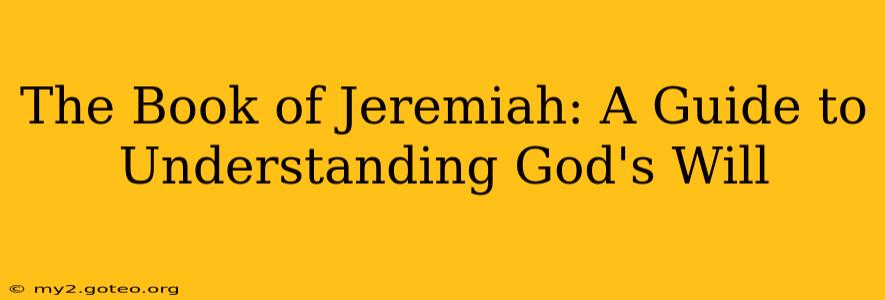The Book of Jeremiah, a central text in the Hebrew Bible and the Old Testament, stands as a powerful testament to faith, prophecy, and the unwavering pursuit of God's will, even amidst seemingly insurmountable challenges. Often referred to as the "Weeping Prophet," Jeremiah's story resonates deeply with readers across millennia, offering profound insights into God's plan and the complexities of human obedience. This guide will delve into the core themes of the book, providing a framework for understanding its enduring relevance.
What is the main message of the Book of Jeremiah?
The overarching message of the Book of Jeremiah centers on God's unwavering covenant with his people, Israel, and the consequences of their disobedience. Jeremiah prophesied during a period of intense societal and spiritual decline, a time of idolatry, injustice, and moral decay. His message was one of both judgment and hope: judgment for Israel's unfaithfulness and hope for eventual restoration and redemption. He tirelessly warned the people of impending destruction at the hands of the Babylonians, urging repentance and a return to faithfulness to God. While the message is one of impending doom, it’s interwoven with promises of a future restoration and the enduring nature of God’s love. The book ultimately highlights the importance of obedience to God's will, even when it's difficult or unpopular.
What are the key themes in the Book of Jeremiah?
Several key themes weave throughout the Book of Jeremiah, enriching its narrative and deepening its theological significance. These include:
-
God's Covenant and its Breach: The book emphasizes the covenant relationship between God and Israel, highlighting the consequences of breaking that covenant through idolatry and social injustice. Jeremiah’s prophecies underscore God’s holiness and his righteous anger toward those who violate his covenant.
-
Judgment and Repentance: A prominent theme is God's judgment on Judah for their wickedness. However, this judgment is not presented as arbitrary punishment; it’s a consequence of their actions. Jeremiah consistently calls for repentance, emphasizing that turning back to God is the only path to avoid destruction.
-
Hope and Restoration: While the book depicts a dark period of judgment, it also offers hope for the future. Jeremiah prophecies the eventual restoration of Israel, highlighting God's enduring love and commitment to his people. This promise of restoration provides solace and reassurance amidst the devastation.
-
The Suffering Servant: Jeremiah's experiences, filled with persecution and hardship, foreshadow the suffering of the "suffering servant" in Isaiah, a figure who anticipates Jesus Christ. Jeremiah's willingness to endure suffering for his prophetic calling serves as a powerful example of faithfulness to God.
-
The New Covenant: Jeremiah prophesies about a new covenant that God will establish with his people, a covenant written not on stone but on their hearts. This new covenant signifies a deeper and more intimate relationship between God and his people, a concept central to the Christian faith.
What is the significance of Jeremiah's call to prophecy?
Jeremiah's call to prophecy, recounted in Jeremiah 1, is significant because it depicts God’s initiative in choosing him despite his youth and perceived inadequacy. God assures Jeremiah of his presence and support, empowering him to deliver challenging messages to the people of Judah. This call underscores God's sovereignty and his ability to use unlikely individuals to accomplish his purposes. Jeremiah’s reluctance, coupled with God's unwavering insistence, shows the nature of prophetic calling—a mission not always welcomed but ultimately essential for God’s plan.
What are the main prophecies in the Book of Jeremiah?
Jeremiah's prophecies covered a wide range of topics, including:
-
The destruction of Jerusalem: A central prophecy concerned the impending destruction of Jerusalem by the Babylonians, a devastating event that marked a turning point in Israel's history.
-
The Babylonian exile: Jeremiah foretold the exile of the Jewish people to Babylon, a period of captivity that lasted several decades.
-
The restoration of Israel: Amidst the prophecies of judgment, Jeremiah also offered hope for the eventual return of the Israelites to their homeland and the rebuilding of Jerusalem.
How can we apply Jeremiah's message to our lives today?
The message of Jeremiah remains powerfully relevant today. His story offers lessons in:
-
Obedience to God's will: Even when it’s difficult or unpopular.
-
The importance of repentance: Acknowledging our failings and turning to God for forgiveness.
-
Finding hope amidst suffering: Maintaining faith in God's love and promises even in challenging circumstances.
-
The enduring nature of God's covenant: Knowing that God's love and commitment to his people remain steadfast.
The Book of Jeremiah is not simply a historical account; it's a timeless exploration of faith, obedience, and God's unwavering love. By understanding its themes and messages, we can gain deeper insights into God's plan for humanity and find guidance for our own lives. The prophet's unwavering faithfulness, even in the face of adversity, serves as a powerful inspiration, reminding us that God's will, while sometimes challenging, ultimately leads to restoration and hope.

